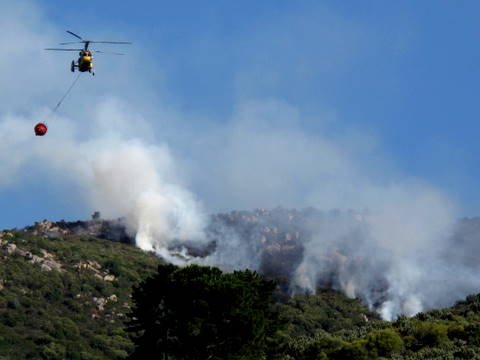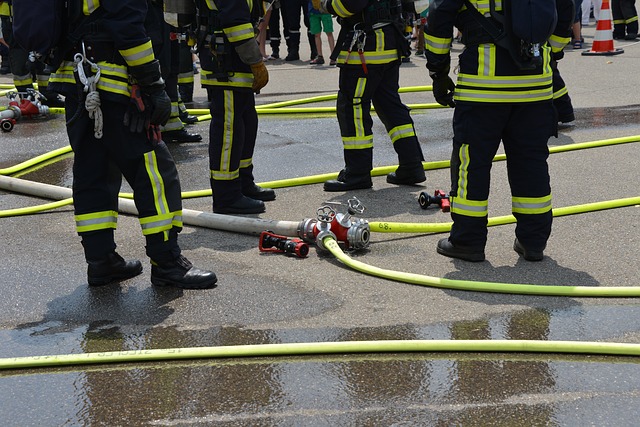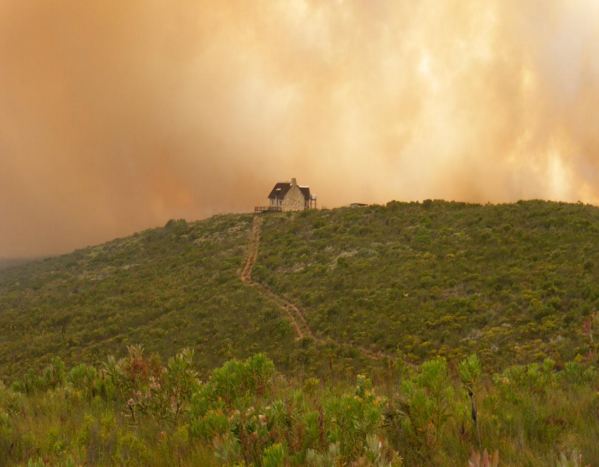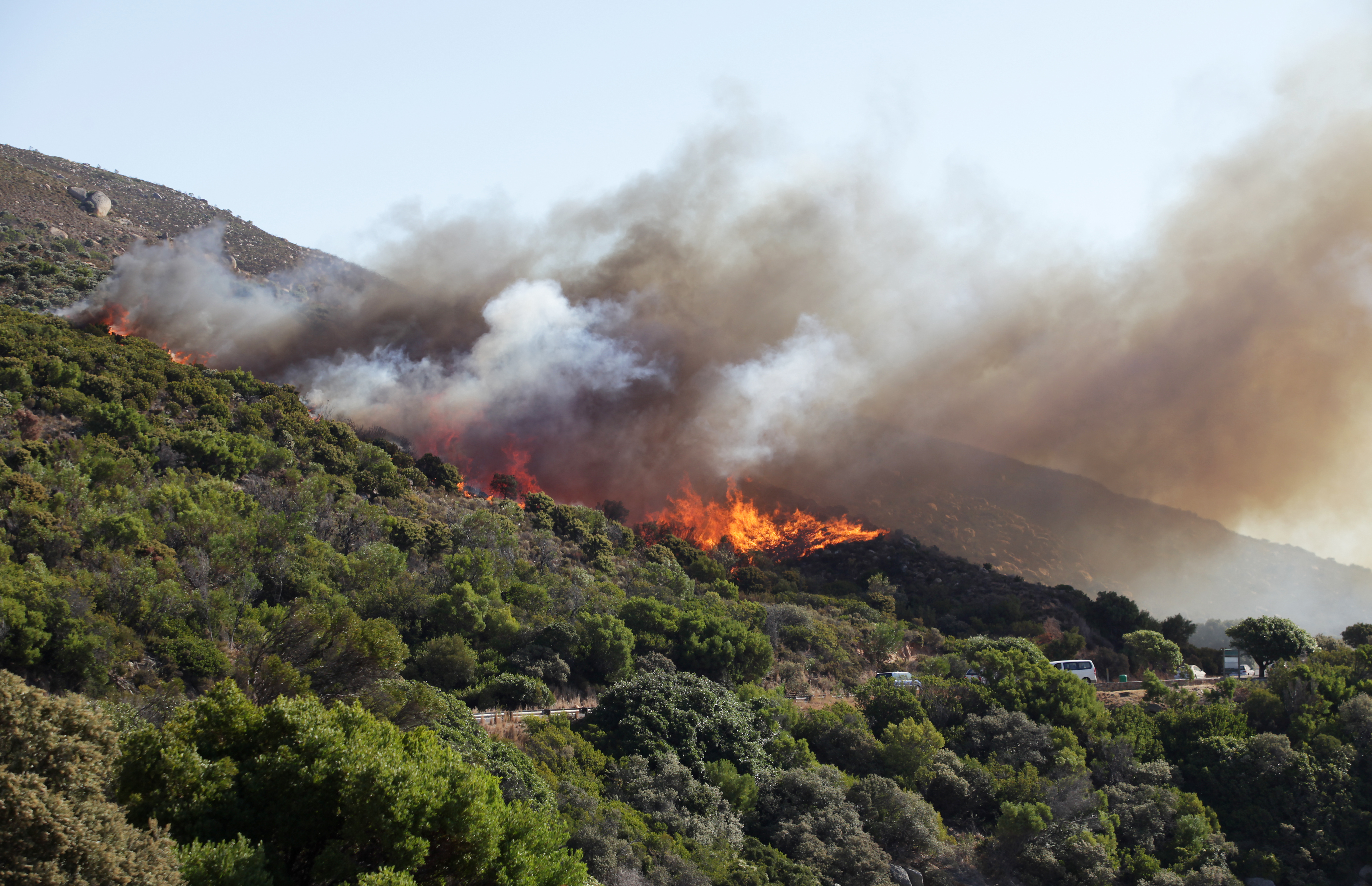Wildfire safety
 Wildfires (also referred to as veld fires) are fires outside urban areas that have the potential to spread out of control. Most wildfires are started by people, while a smaller number are started by natural occurrences such as lightning.
Wildfires (also referred to as veld fires) are fires outside urban areas that have the potential to spread out of control. Most wildfires are started by people, while a smaller number are started by natural occurrences such as lightning.Generally veld fires spread:
- Faster uphill than downhill.
- With the wind, rather than against it.
- Faster where there is dead plant material.
- Faster in fine fuels.
- Faster where the vegetation canopy is intertwined.
Although wildfires can have devastating effects on people’s lives and property, they are also very important for local ecosystems. For example, the heat generated by fires help certain plant seeds to grow.
So, having a better understanding of veld fires can help you to be better prepared.
Fire Danger Rating
This national system classifies fire danger in five categories:
- Insignificant (blue). The fire danger is so low that no precautions are needed.
- Low (green). Fires, including prescribed burns, may be allowed in the open air on the condition that persons making fires take reasonable precautions against fires spreading.
- Moderate (yellow). No fires are allowed in the open air, except those that are authorised by the Chief Fire Officer of the local fire service, and those in designated fireplaces. Authorised fires may include prescribed burns.
- High (orange). No fires are allowed under any circumstances in the open air.
- Extreme (red). No fires are allowed under any circumstances in the open air, and special emergency fire preparedness measures are necessary.
Prevention and fire strategy 
Landowners, and especially hospitality and tourism businesses operating in an area where wildfires are common, should pay particular attention to the protection and safety of their guests and employees.
Any fire strategy should include the following components:
- Awareness
It is estimated that as many as 90% of unwanted unnatural fires are caused by people. It is important to know where and when these dangers occur and where the danger areas are.
- Prevention
Education and new management systems may be necessary to prevent fires.
- Preparedness
The best way to be prepared is to comply with the provisions of the National Veld and Forest Fire Act, creating and maintaining adequate fire breaks and to join or form a local Fire Prevention Association (FPA) in your area.
What you should do when veldfire approaches your property
- Decide whether it is safer to stay or leave the scene.
- Wear protective clothing and footwear.
- Have emergency food and medical supplies ready.
- Move livestock to safer areas.
- Listen to the radio for news updates.
- Wet the garden and house, especially on the side of the approaching fire.
- Plug gutters and fill them with water.
- Fill baths, buckets and dust bins with water in case the water supply fails, and have mops handy.
- Seal any gaps between the doors and floor using wet towels or similar items.
- Close all windows and doors.
- If you decide to stay, go indoors and remain there until the fire has passed.
- Take fire hoses and other firefighting equipment indoors with you.
- Check inside the house, including the roof cavity, and extinguish any small fires immediately.
- Remain vigilant after the fire has passed.

- If you decide to evacuate your home, remember that every second counts:
- Escape first, then call for help. Develop a home fire escape plan and make sure everyone in the family gathers at an agreed meeting place outside.
- Make sure everyone in the family knows two ways to escape from every room.
- Practise feeling your way out with your eyes closed.
- Never stand up in a fire, always crawl low under the smoke and try to keep your mouth covered.
- Practice your family emergency plan / home escape plan frequently with your family.
- Never return to a burning building for any reason, you could die.
- Finally, having a working smoke alarm dramatically increases your chances of surviving a home fire.
Injured animals
If you come across any injured animals, or if you want to volunteer, you can call the Cape of Good Hope SPCA at 021 700 4159/8 or visit their Facebook page for more information.
Reporting fires
When reporting fires, please contact your Local District Municipality
- City of Cape Town: 107 or 021 480 7700 from a cellphone
- Overberg: 028 425 1690
- West Coast: 022 433 8700
- Eden: 044 805 5071
- Central Karoo: 023 414 2603
- Cape Winelands: 021 887 4446
You can also contact the City of Cape Town’s Fire Safety offices to report fire dangers.
Be sure to save the appropriate number on your cellphone and to teach it to your children.
Useful information 
The Disaster Risk Management at the City of Cape Town has made the following information available to the public to help ensure their safety:
- Frequently asked questions about fire safety
- Family disaster preparedness guidelines
- Protect yourself from fire
- Urban fringe fires
The Working on Fire programme (WoF), funded by the South African Government, is one of South Africa's most successful poverty alleviation, job creation and community upliftment initiatives.
Please visit their website for more information or follow follow WoF on Twitter for daily updates.
Extra information
- Fire Danger Index
- Fire Warnings – Live Updates
- Advanced Fire Monitoring System (AFIS)
- National Veldfire Information System
- Veld Fire Awareness
- VitalFire Weather
- Western Cape Provincial Government Veld Fire Plan 2014/2015
- Road Safety near Veld Fires
- Protecting Your Property from Veld Fires
- Disaster Management and Fire Brigade Services Chief Directorate
- Fire and Life Safety Strategies Seminar
Video
Find out how you can get involved to help fight wildfires in the Western Cape.


